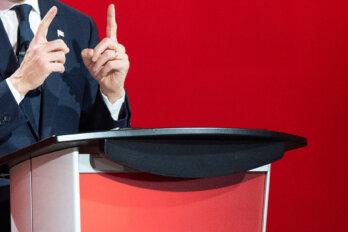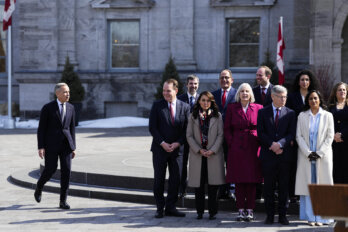On January 20, 2017, Rabbi Marvin Hier solemnly stepped to the podium outside the Capitol building in Washington and addressed an audience of millions. Behind him was Barack Obama. To his right, a stoic Donald Trump, who, in a few short minutes, would take the oath and become the forty-fifth president of the United States.
Hier, wearing a blue kippah and dark coat, began to pray. “Bless all of our allies around the world who share our beliefs,” he intoned. “May the days come soon when justice will dwell in the wilderness and righteousness will abide in the fertile fields.”
In 1977, Hier helped found the Simon Wiesenthal Center, an international organization—named after one of the world’s most famous Nazi hunters—that combats hate speech and raises awareness of the Holocaust. As Hier spoke about blessings and righteousness, somewhere in the crowd, Richard Spencer was listening. Spencer, one of Trump’s most outspoken fans, is best known for coining the term “alt-right” to describe his brand of conservatism, which aims for a United States ruled by white people to the point of advocating for “peaceful ethnic cleansing.” Weeks earlier, at a party held by Spencer’s National Policy Institute, Spencer had been recorded yelling “Heil Trump! Heil our people! Heil victory!”
Trump might never build his border wall or bring back coal-mining jobs or even avoid impeachment, but his presidency has already led to at least one miracle: he’s gotten white nationalists (some of whom have adopted the words, symbols, and ideas of the Third Reich) and an increasingly conservative faction of Jews to agree—at least when it comes to the greatness of Donald J. Trump.
The president has been praised both by self-styled “America’s rabbi” Shmuley Boteach and by former Ku Klux Klan leader David Duke; Trump’s closest advisors are Jared Kushner, the Orthodox Jewish real-estate magnate who doubles as his son-in-law, and Stephen Bannon, the former Breitbart executive chairman who once described his news website as “the voice of the alt-right.” (Bannon’s ex-wife claimed that he ruled out a school for their children because too many of its students were Jewish.)
As other right-wing nationalist movements gain momentum in the United Kingdom, France, Poland, and Hungary, these kinds of unlikely partnerships will keep cropping up. But as history has repeatedly shown, when politics become more populist, some people find themselves on the outside looking in. The Muslim community is currently facing the harshest scrutiny and violence. But studying Judaic history tends to breed paranoia: the rise of extreme movements rarely spells good things for the tribes of Israel.
The question isn’t whether this big tent that houses Jews and the alt-right will collapse—it’s how bad the damage will be for Jews, and our democratic institutions, when it inevitably does.
“It stunned me. I’d say 60 percent of Montreal Jews are pro-Trump. I say, ‘Are you listening to him?’ Israel! All they know is Israel.”
As CNN broadcasts Trump’s inauguration, Beryl Wajsman offers running commentary from the smoky confines of the cigar room in Chez Alexandre, a regal restaurant in downtown Montreal. With his grey stubble, black jacket, black shirt, and black boots, Wajsman has the appearance of a punk-rock rabbi (although the non-kosher chicken wings in front of him put to rest any notion of Orthodox piety).
Wajsman prefers to be referred to as an “activist,” though he does not fit the leftist mould the word usually suggests. In his role as editor-in-chief of the Montreal weekly newspaper the Suburban, he’s railed against student protesters and other progressive causes. But in conversation, he will hail the Jewish tradition of supporting civil-rights movements. From his bully pulpit, Wajsman has rallied his readers around his favourite issues—his top two are anglophone rights and the importance of a strong, defended Israel. To Wajsman, support for the continued existence of a Jewish state is a defining aspect of one’s moral character. “The litmus test of every generation always is one thing,” he declares. “During the Depression, it was how we treated the poor. Then came civil rights, then came the Vietnam War. Israel is today’s litmus test.”
On the Canadian side of the border, more and more Jews have found the left failing that test. Stephen Harper’s unwavering support for Israel attracted many Jews to the Conservative Party—an Ipsos exit poll during the 2011 election noted that the Tories received 52 percent of the votes cast by Jews (no data is available for the 2015 election).
In the US, though, the shift right has not been as prevalent: a post-election Pew poll showed that roughly 70 percent of Jews voted for Hillary Clinton. But many Canadians—and conservative American Jews—monitoring the race saw something they found troubling: in the final days of the Obama presidency, the US declined to veto a United Nations Security Council resolution condemning Israel and freed up $221 million in aid money for the Palestinians. For many, this was a confirmation that just as Canadian Liberals had abandoned Israel, so, too, had the American Democrats.
From the perspective of these conservative, ardently Zionist Jews, Trump is set to become the best friend Israel has ever had in the Oval Office. They see a man with a Jewish daughter and son-in-law who will guide him toward pro-Israel policies, such as giving that government a pass on building and maintaining settlements in the West Bank.
But another group of Americans look at Trump and see something completely different. Some who identify as alt-right see Trump as a defender of a white homeland, a leader who, through stringent immigration regulations and mass deportations, will bring a return to America’s more homogeneous heyday. This group is paranoid about the spread of sharia law and the dilution of ethno-European culture.
Some Jews seem to have found common ground with the alt-right on this issue. There is one problem, though: not all the Trump boosters think that Jews actually count as “white.”
The collision of interests has Jews who lean left feeling nervous. David Lisbona, a long-time activist for Canada’s federal Liberal party, says there has been a political split in his community. He compares the situation playing out in the US to the 1994 action flick Speed. “If you support Trump, you’re on a bus, and you don’t know where it’s going to end up,” he says. “It’s like Keanu Reeves—you’re just going 100 miles per hour.”
It should be noted that at the end of the movie, the bus blows up.
To be a right-wing supporter of Zionism is to feel continuously outraged. If you’re on social media with like-minded people, your timeline is full of news stories about students promoting boycotts of Israel, and attacks at the UN or in the Arab world. Family members and friends post videos from Breitbart and other right-wing sites about Muslim clerics calling for the death of the Jews and the end of the West, or of campuses where Jewish students have been accosted for being Zionists. They see pro-LGBTQ groups rallying against Israel with Palestinians and scratch their heads in utter confusion. “Doesn’t anybody see the truth of what’s going on?” they ask. “Has the world gone crazy?”
With the rise of far-right populists across the West, there’s now another group saying the same thing. Leaders such as Marine Le Pen of France and Geert Wilders of the Netherlands are calling out radical Islam by name. Because of this, some Jews view them sympathetically (never mind that Le Pen’s father—a previous leader of her National Front political party—is a notorious Holocaust denier). “You see Jews want to support Le Pen in a sense because they’re fighting back against this concept [of radical Islam],” says Jordan Turner, a self-described small-c conservative in Montreal. “Jews are being harassed constantly in France and leaving France in droves to Israel, away from France, away from persecution there.”
For this subset of conservative Jews and far-right politicians, what is at stake is the future of Western culture: though the Jewish perspective is less reflexively obsessed with race, both groups express their concerns in terms of security. Some alt-righters will acknowledge that few Muslims will ever participate in violent attacks, but argue they pose a threat to—as Canada’s Kellie Leitch might put it—a country’s “values.”
Of course, these are notions rejected by most Jews, here and abroad. As Wajsman points out, Jewish families and synagogue communities across Canada—who remember the trauma of being turned away from these shores during the Holocaust—have sponsored Syrian refugees.
Still, for those Jews who are cheering on the immigration policies of Trump (and Leitch, and Le Pen, and Wilders), multicultural values are taking a back seat to what they see as pragmatism. For those squeamish about being on the same side as alt-right nationalists who, historically, have had little love for Semites, there are few options: leave the fold in protest, grudgingly accept the “big tent,” or simply downplay the threat that the alt-right poses.
But ignoring the white nationalists in the room is getting more difficult. Online, many alt-right leaders and their followers have no qualms about sharing their true feelings about Jews. Richard Spencer has become a household name because of his racist and anti-Semitic stances. Lesser-known icons include Tim Treadstone, who, under the Twitter name Baked Alaska, has often posted about the “Jewish Question”—or JQ—to his 150,000 followers, referencing Jewish control of the media and allusions to gas chambers.
While much of the alt-right’s hate is still focused on Muslims, liberals, and the “cuckservatives” who oppose Trump, some have also taken to tweeting anti-Semitic memes to Jewish journalists and debating the JQ—a question that, depending on who is asking, can be as benign as “What role should Jews play in American society?” or as horrific as “How can we best eradicate them?”
Anti-Semitic words and threats that first surfaced on the internet are now appearing on our streets. Since Trump’s inauguration, more than fifty Jewish community centres and schools in the US have received bomb threats (a number of these have since been traced to an Israeli teenager). In Canada, threats have been made against a Jewish school in Vancouver and a community centre in Toronto. Jewish residents in Toronto have also reported swastikas and anti-Jewish notes posted on their homes. And, of course, it must be noted that violence is not just affecting Jews. Muslims around the world are facing both bigotry and violent attacks—the alleged shooter at a Quebec City mosque that left six people dead in February is an avowed Trump and Le Pen supporter.
While some Jewish thinkers such as David Frum have warned of the dangers of ultra-nationalist extremism, Wajsman says that, for most Jews—including those who lean right—they simply don’t register. “They’re dismissing [the alt-right],” says Wajsman. “They’ve got it in their heads and they’re saying ‘[Trump’s] controlling them. He doesn’t need them—he’ll use them for votes and tell them to fuck off.’”
It’s now been more than four months since the election, and that hasn’t happened. Instead, the president has engaged in a war of words with the Anne Frank Center over omitting Jews from a statement regarding International Holocaust Remembrance Day; told an Orthodox Jewish reporter asking about anti-Semitism to “sit down”; and, while standing next to Israeli prime minister Benjamin Netanyahu, dodged questions about anti-Jewish attacks by boasting about his electoral-college victory. The president did finally use his joint address to Congress to denounce hatred and the desecration of Jewish cemeteries in St. Louis and Philadelphia. Still, he offered no concrete plan to fight this problem.
Trump has also failed to speak publicly about the Quebec City mosque attack, or to combat the violence and hate that Muslims face in the US. He has, however, instructed a federal anti-terrorism force to focus exclusively on attacks by Muslims.
What does this all mean for the Jews? Can a Bannon and a Kushner find common ground? Will the Spencers and the Hiers of the world break bread?
Wajsman refers me to Leslie Epstein’s novel King of the Jews, which follows a judenrat, or Jew who served as a go-between for his community and the Nazis during the Holocaust. In other words, these types of alliances are not without precedent.
The comparison isn’t perfect—the Holocaust would have been just as bloody without the co-operation of administrative councils of Jews—but there’s truth at its core. For now, there might be common cause between the two groups. But whenever extremism arises, there’s little doubt that pogroms and persecution will follow.
I ask Wajsman if he thinks that kind of disaster is inevitable. His tone becomes that of the exasperated Hebrew-school teacher (paranoia might be a Jewish trait; making predictions, not so much).
“I don’t know yet! I don’t know!” he says. “Of course I see parallels. Anything is possible in this world.”
The world has always been dangerous for the Jews, and politics does make for strange bedfellows. But we must be careful who we’re shluffing with. You don’t want to wake up and find out your ally is out to schtupp you next.




